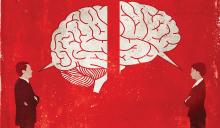
Do you know where depression comes from? Do you understand what an antidepressant does to make a person feel better? Cognitive psychologist Jessecae Marsh and Andrew Zeveney ’14G have new research showing that members of the general public believe they know the answers to these questions much better than they actually do.
Previous research has shown that people think they understand how everyday objects, like air conditioners and faucets, work. However, when asked to explain how something as ordinary as a faucet actually works, people quickly realize that they actually understand much less than they thought. Marsh and Zeveney examined whether this illusion of understanding existed for mental health disorders and their treatments. Mental disorders are notoriously misunderstood by the general public, and scientists are open about how much more there is to learn about mental health. Does the lay public still overestimate their understanding?
Marsh, assistant professor of psychology, and Zeveney asked participants to estimate how well they knew how the symptoms of different mental disorders develop and how different disorder treatments alleviated symptoms. They then asked participants to provide a detailed explanation of how those symptoms developed or how those treatments worked. While people were initially confident that they understood how disorders and treatments worked, after attempting to explain the phenomena, people’s confidence in their ratings dropped dramatically.
“Ask someone how an antidepressant works and they say they know how it works, but ask them to explain it to you, and they will eventually admit they have no idea what its actual mechanism is,” says Marsh.
Though the research is ongoing, Marsh notes that the results are informative as to the extent of people’s overconfidence in the area of health care. Overconfidence may give people a false sense of understanding what treatment would best address a disorder’s symptoms since they feel like they understand how the disorder works, at least in some part.
“We know from other work in our lab that how people think about the causes of mental health symptoms dictates their treatment choices. If people think they understand how symptoms develop, when they really do not, they could be making some ill-guided treatment decisions.”
































